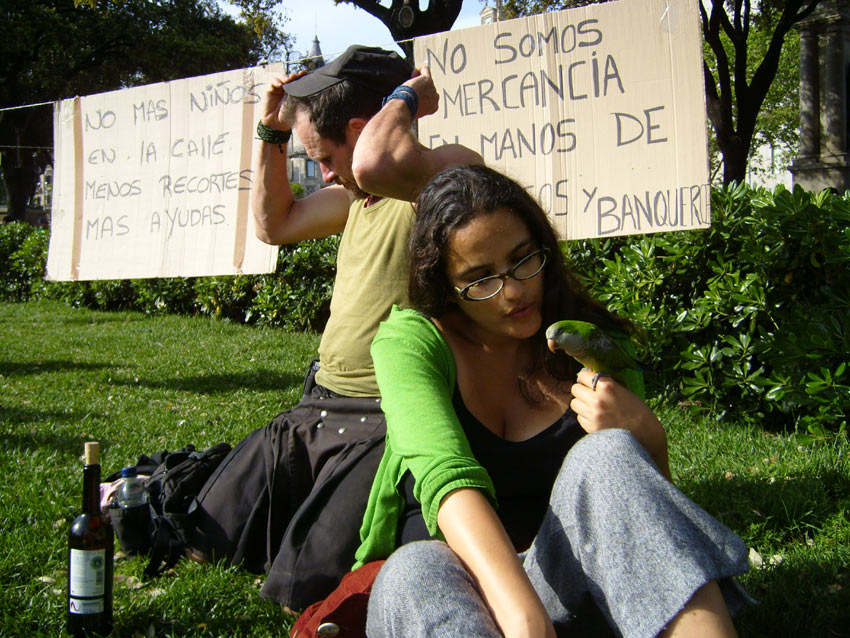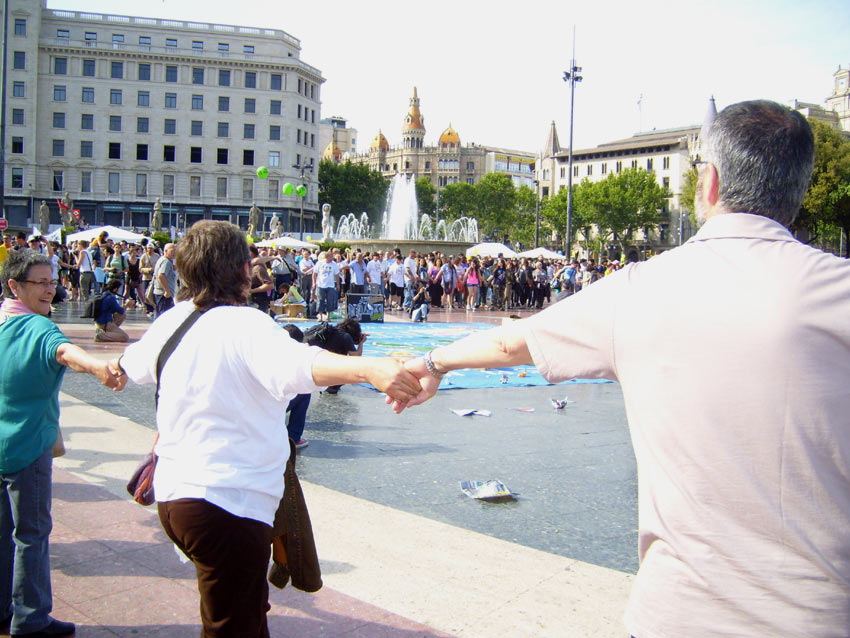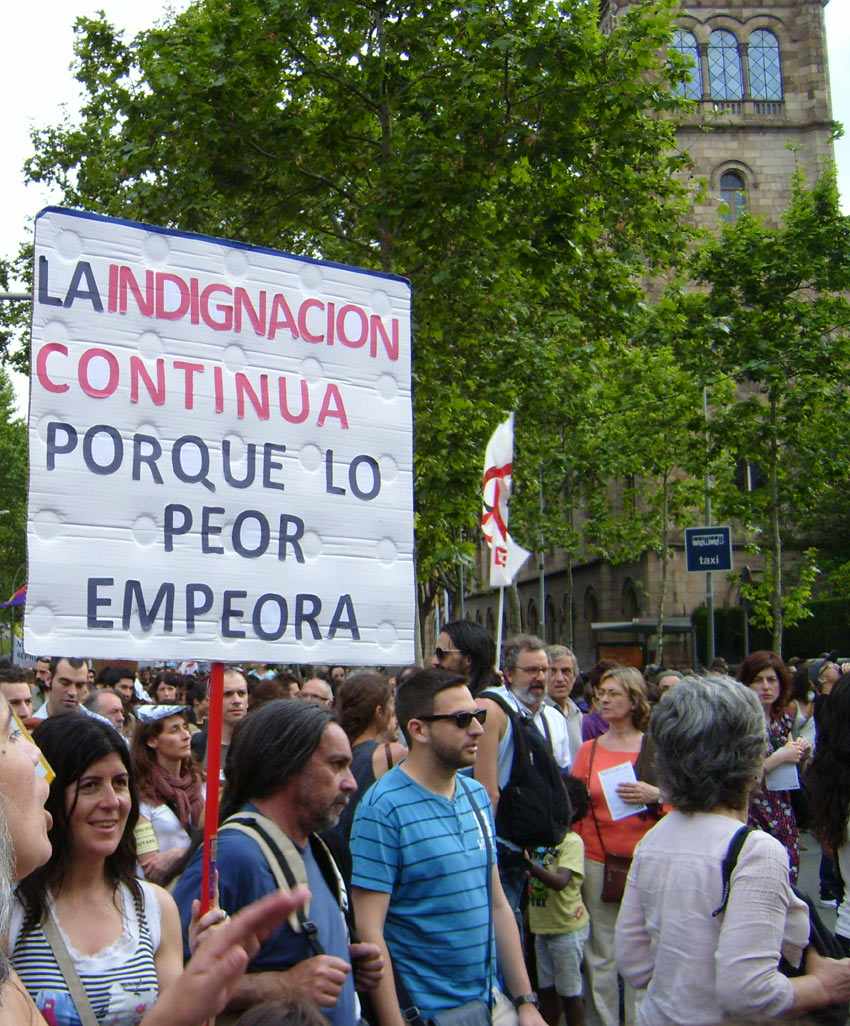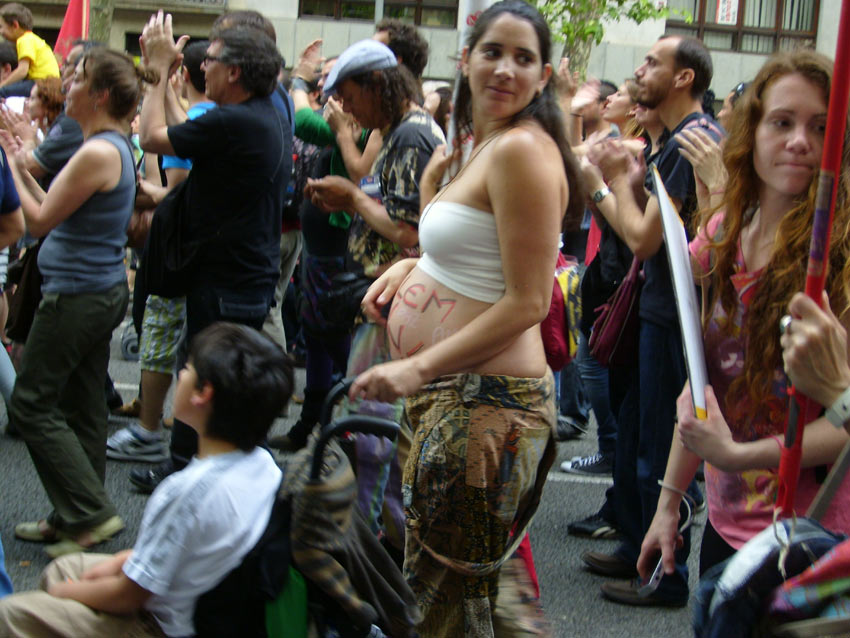Somewhat staggeringly, I have managed to live in Barcelona for precisely one year now without writing about the growing sense of social unrest on the streets of the city. I sometimes wonder if this is because I take it for granted. I arrived at the tail end of April last year, just two weeks before the first wave of ‘indignant’ protesters set up camp in the city’s central Plaça Catalunya. Watching disenfranchised members of society stick two fingers up at authority was my induction into Barcelona.
A year ago, back in May 2011, dreadlocked folk selling herbal remedies had occupied the square, and the result was a civic embarrassment. Tents, stalls, hammocks and even shopping trolleys suspended from branches all sprang up as the little impromptu community took heart from the Arab Spring and set up base.
Get outraged!
I wandered round taking photos of the tents and slogans but in truth I had little idea or sympathy for what it was all about.
I knew the facts and figures, of course. Economically, Spain was on its knees. The country had had the highest rate of unemployment in the Euro-zone since as long as I could remember and was all-too-neatly classed as one of the ‘PIGS’ – that casually derogatory term for the peripheral European economies of Portugal, Italy, Greece and Spain.
Armed with the seminal book Indignez-vous! that was said to have started the whole thing, I considered myself informed.
Running from revolution
Something about the complete lack of any concrete objectives accompanying the activists’ howls of protest left me cold. OK, so the context more than justifies a groundswell of anger.
The backdrop is unrelentingly grim – one out of every four Spaniards is out of work, young people don’t stand a hope in hell of finding a job, university tuition fees are rising, savage public spending cuts are underway and Madrid’s stock market has already lost 20% of its value so far in 2012.
Add the icing on the cake of corrupt politicians and structurally inept banking practices and it’s hard not to sympathise with the hordes of royally pissed-off people.
Understanding the reasons behind the backlash is one thing, and people mobilising against social injustice and corruption is all well and noble, but what changes has it brought about?
Let’s be clear – I am the last person you will ever hear advocating civil disobedience. Crowds make me uneasy. Talk of revolution makes me feel quite faint.
In fact, when the general strike took place at the end of March, resulting in rubber bullets and tear gas (not to mention the pointless sacrifice of countless burning bins) I resolutely headed in the opposite direction – to a purposefully pre-booked hair appointment.
Getting my roots done seemed infinitely more sensible than risking the wrath of the mossos. (Have you seen the size of their guns?!)
From indignation to action?
But I felt compelled to show up this weekend at what was being called a celebration of the 1-year anniversary of the 15M movement (referring to the 15th of May last year, when the indignados first began to make their presence felt).
Maybe it’s the gnawing guilt at having bodyswerved the whole thing for a year. Maybe it’s the sight of people rummaging about in rubbish bins every day for food.
Or maybe it was the particularly shocking sight of an entire family – mum, dad, 2.4 kids – settling down under makeshift cardboard blankets in a shop doorway the other night that has finally galvanised me into political consciousness.
So we caught the metro to the city’s main square for 6pm, when the march was scheduled to kick off.
Saturday had been a particularly scorching day and at this hour the square was still basking in spring sunshine.
The mood was jovial, good-natured, and optimistic.
In one corner of the square there were activists handing out flyers against the pollution caused by plane fumes over a Catalan town, while in another protesters united in chant at the fallout from the Spanish property bubble – the hundreds of thousands of families who’ve been evicted for failing to keep up with mortgage payments.
Protesters linked arms and formed a spontaneous circle right around the plaza, rushing the centre to cheers and cries of “justicia!”
The atmosphere verged on festive. Balloons bunched in the distance. Random fire-crackers went off intermittently (dogs and parrots ducked for cover).
Brazilian drumming bands started bonging out samba and the smell of dope established itself on the breeze.
Other than illegal substances, the air was heavy with irony. The slogans made me smile, and think.
“I don’t want to live worse than my grandparents.” “Next stop Iceland.” “If you don’t, who will? If not now, when?” “Unfuck the world.” “Estafa bankiaria” (in reference to news over the last few days that the Spanish government has had to part-nationalise Bankia, the country’s largest retail bank). “Capitalism, or in other words, don’t bother coming in tomorrow.”
At one comical moment, some protesters started to walk backwards, chanting “this government takes us up the arse” while waving cheerfully to the helicopters overhead.
It felt invigorating to be part of something important. I can be indignant with the best of them. Still, I couldn’t help questioning what the ultimate point was.
It will be really interesting over the coming months to see if social indignation can be converted into a focused, political agenda capable of effecting real change. What do you think?

GuiriGirlinBarca is written by native Scot Julie Sheridan, who left Edinburgh’s haar-stricken hills for the slightly sunnier shores of Barcelona in April 2011. Armed with a big red emigrating suitcase (called La Roja) she arrived in the Catalan capital without knowing a soul, or indeed any Catalan. Her blog is an honest account of the ups and downs of life abroad as a single woman, including now not to get stalked by men and how to avoid unfortunate incidents with hamsters on bank holidays.













